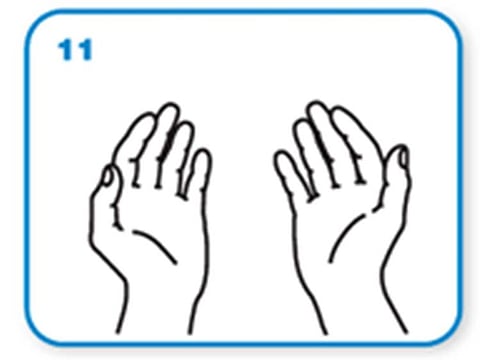Coronavirus: Why air-dryers are a big no-no
Washing and drying hands properly is the best way to prevent spread of Covid-19

The oft-repeated mantra to wash your hands doesn’t often emphasise the importance of how to dry them. But whenever possible, and especially in a public restroom setting, think twice before using the hand dryers, which can suck bacteria from the air right onto those newly cleaned hands.
For the novel coronavirus, data doesn’t yet exist indicating that bathrooms, specifically, are a place where the virus spreads. “What we do know is that air blowers in the bathroom circulate all the germs and air particles around, and we know that is not a good thing,” said Christina Johns, senior medical adviser.
“Certainly, any type of microbe that has increased longevity on surfaces is always concerning when you have big motors on, especially particles that have settled and are not yet wiped down with a bleach wipe.”
When a motor blows particles in the air, they become aerosolized particles. “Then you inhale or touch your face with your hand, and there’s now an entry into your body,” Johns said.
Many health-care and restaurant settings are moving away from hand dryers and offering paper towels instead. Air dryers that dry hands through evaporation circulate less bacteria than the high-speed jet dryers
Bathrooms are full of frequently touched surfaces, “so there is a high burden of contamination from germs,” said Craig Shapiro, a top physician in infectious diseases. No one yet knows for sure how long the coronavirus can live on surfaces. It could be two hours or 24 hours but similar respiratory viruses are spread through contact on surfaces.
Risky: Public restrooms
Public restrooms are probably one of the riskiest environments for transmission for germs. An uncovered flushing toilet emits a mist of microbes as high as 15 feet in the air (you may want to think twice before leaving a toothbrush on the counter). And with public restrooms, you don’t know how often they are being cleaned and what disinfectants are used.
The Centers for Disease Control and Prevention’s hand-washing recommendations specify air drying or paper towels. Drying hands is crucial for good hygiene: Wet hands transfer germs more easily than dry ones. Medical research backs up that recommendation. And although the CDC doesn’t explicitly recommend avoiding hand dryers, studies have shown that such dryers, especially the ultra-high speed jet dryers, disperse far more bacteria than single-use paper towels.
In a study comparing three hand-drying methods (paper towels, warm air dryers and jet air dryers at ultra-high speeds), scientists found that jet dryers dispersed 20 times more virus than the warm air dryer and over 190 times more than paper towels, and that the impact of the virus was greatest at 21/2 feet to 4.1 feet — which is about where a small child would be standing.
Colony of bacteria
In a separate study, scientists found that Petri dishes exposed to bathroom air hand dryers grew significantly more colonies of bacteria. Without hand dryers on, the Petri dishes had less than one colony of bacteria; with 30 seconds of hand dryers on, the Petri dishes had an average of 18 to 60 colonies, one even as high as 254.
Jet dryers can come with HEPA filters, which are designed to prevent bacteria from being pushed out of the dryer, but in the research studies, scientists concluded that most of the bacteria from the hand dryers was coming from the bathroom air, as opposed to inside the dryer itself.
Before swearing off public restrooms forever, there are a few steps one can take to improve the sanitary situation: Closing the toilet lid can prevent the aerosol mist. Additionally, low-pressure toilets are increasingly more common and emit less aerosol mist than high-power flush ones.
Many health-care and restaurant settings are moving away from hand dryers and offering paper towels instead. Air dryers that dry hands through evaporation circulate less bacteria than the high-speed jet dryers.
If you must use a dryer, Johns said, rub your hands vigorously to minimise the time it has to stay on. And parents should do whatever they can to make sure kids avoid touching the nozzle. The ideal option, Shapiro said, is the single-use paper towels dispensers that use motion sensors, so no touching of surfaces is required.
Bacteria can cling to water droplets on wet hands. So if the jet dryer is the only option, use it.
— Rebecca Gale is an award-winning American journalist
Also Read: Coronavirus: Cinemas in Dubai closed
Also Read: What leaders said about coronavirus
Sign up for the Daily Briefing
Get the latest news and updates straight to your inbox



